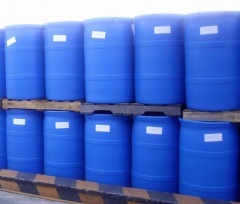Difference between revisions of "Methyl tertiarybutylether (MTBE)"
| Line 7: | Line 7: | ||
| risk factors = See text | | risk factors = See text | ||
}} | }} | ||
| + | __TOC__ | ||
==Description / Application== | ==Description / Application== | ||
Methyl tert-butyl [[ether]], also known as methyl tertiary butyl ether and MTBE, is an organic compound. MTBE is a volatile, flammable, and colourless liquid that is immiscible with water. It has a minty odour vaguely reminiscent of diethyl ether, leading to unpleasant taste and odour in water. MTBE is a gasoline additive, used as an oxygenate to raise the octane number. Its use is controversial in the US and declining in that country in part because of its occurrence in groundwater and legislation favouring ethanol. Worldwide production of MTBE has been constant at about 18 million tons/y (2005) owing to growth in Asian markets which are less subject to ethanol subsidies.<br><br> | Methyl tert-butyl [[ether]], also known as methyl tertiary butyl ether and MTBE, is an organic compound. MTBE is a volatile, flammable, and colourless liquid that is immiscible with water. It has a minty odour vaguely reminiscent of diethyl ether, leading to unpleasant taste and odour in water. MTBE is a gasoline additive, used as an oxygenate to raise the octane number. Its use is controversial in the US and declining in that country in part because of its occurrence in groundwater and legislation favouring ethanol. Worldwide production of MTBE has been constant at about 18 million tons/y (2005) owing to growth in Asian markets which are less subject to ethanol subsidies.<br><br> | ||
Revision as of 08:35, 12 August 2013
| Infobox on Methyl tertiarybutylether (MTBE) | |
|---|---|
| Example of Methyl tertiarybutylether (MTBE) |  |
| Facts | |
| Origin | - |
| Stowage factor (in m3/t) | - |
| Humidity / moisture | - |
| Ventilation | - |
| Risk factors | See text |
Methyl tertiarybutylether (MTBE)
Contents
Description / Application
Methyl tert-butyl ether, also known as methyl tertiary butyl ether and MTBE, is an organic compound. MTBE is a volatile, flammable, and colourless liquid that is immiscible with water. It has a minty odour vaguely reminiscent of diethyl ether, leading to unpleasant taste and odour in water. MTBE is a gasoline additive, used as an oxygenate to raise the octane number. Its use is controversial in the US and declining in that country in part because of its occurrence in groundwater and legislation favouring ethanol. Worldwide production of MTBE has been constant at about 18 million tons/y (2005) owing to growth in Asian markets which are less subject to ethanol subsidies.
MTBE is manufactured via the chemical reaction of methanol and isobutylene. Methanol is derived from natural gas, and isobutylene is derived from butane obtained from crude oil or natural gas, thus MTBE is derived from fossil fuels. In the United States, it was produced in very large quantities (more than 200,000 barrels per day in 1999) during its use as a fuel additive.
MTBE is almost exclusively used as a fuel component in fuel for gasoline engines. It is one of a group of chemicals commonly known as oxygenates because they raise the oxygen content of gasoline.
As a solvent, MTBE possesses one distinct advantage over most ethers - it has a reduced tendency to form explosive organic peroxides. Opened bottles of diethyl ether or THF can build up dangerous levels of these peroxides in months, whereas samples of MTBE are usually safe for years (but they should still be tested periodically). For this reason (as well as its higher boiling point), MTBE is used as a solvent extensively in industry, where safety concerns and regulations make working with diethyl ether, THF, or other ethers much more difficult and expensive. However, despite the popularity of MTBE in industrial settings, it is rarely used as a solvent in academia with some exceptions.
Shipment / Storage / Risk factors
The colourless liquid product is flammable with a characteristic strong odour. Soluble in methanol, diethyl ether. Partially soluble in cold water.
Flash points: -28°C (closed cup)
Boiling point: 55,2°C
Auto-ignition temperature: 224°C
Melting point: -109°C
For overseas carriage aspects of Chemicals, the readers are recommended to acquire or have access to a good chemical dictionary, and a copy of the International Maritime Dangerous Goods (IMDG) Code, issued by the International Maritime Organisation. Also consult the applicable MSDS sheet.











